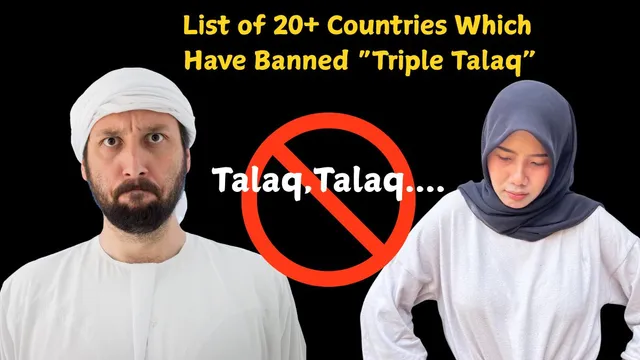- By Aditi Priya Singh
- Thu, 13 Nov 2025 06:36 PM (IST)
- Source:JND
Countries Which Have Banned Triple Talaq: Triple Talaq, also called Talaq-e-Biddat, is a Muslim tradition that allows a husband to immediately divorce his wife by saying the word "talaq" three times. For many years, in some Muslim communities, it was seen as a quick and final divorce. However, this practice has come under heavy fire for breaching women's rights and being unjust to them. After seeing the injustice Triple Talaq created, several Muslim-majority nations decided to outlaw or change the practice to defend the equality and dignity of women.
In 2019, India passed the Muslim Women (Protection of Rights on Marriage) Act, which outlawed triple talaq. However, other nations have also taken this action. This practice had long since been banned in some countries, including Pakistan, Bangladesh, Iraq, Egypt, Indonesia and Tunisia. New rules pertaining to marriage and divorce have been implemented in several nations, requiring formal legal steps rather than an immediate divorce. A powerful step toward gender equality, women's empowerment and justice in Muslim societies worldwide is the move to outlaw triple talaq.
Countries Which Have Banned Triple Talaq
Here is the list of 20+ countries which have banned triple talaq and adopted a strong law prohibiting violations of rights against muslim women.
| Country | Year Banned | Reason for Ban |
|---|---|---|
| Pakistan | 1961 | Unconstitutional, against gender justice; regulated via the Muslim Family Law Ordinance; promotes reconciliation and a written process |
| Bangladesh | 1972 (continued) | Inherited from Pakistan, for women’s rights and legal due process |
| Iraq | 1959 | Adoption of civil court law; only a court-recognised divorce is valid |
| Egypt | 1929 | Reform for gender justice; only one divorce per sitting is valid |
| Turkey | 1926 | Secular reforms under Kemal Atatürk adopted the Swiss civil code |
| Tunisia | 1956 | Only the court can grant a divorce after a reconciliation attempt |
| Algeria | 1984 | Divorce requires a court and a reconciliation process |
| Morocco | 2004 | New family code (“Moudawana”); court involvement and gender equality |
| Sudan | 1929 | The reform for protecting women allowed only one pronouncement |
| Syria | 1953 | Legal reform for due process and women’s rights |
| Jordan | 1951/1976 | Court process mandated for divorce, after efforts of reconciliation |
| Lebanon | 1962 | Legal reform; court approval needed for divorce |
| Libya | 1953 | Legal reforms for marriage regulations and gender equality |
| Kuwait | 1984 | Civil legislation for due process and reconciliation |
| United Arab Emirates | 2005 | Civil court process, written documentation required |
| Saudi Arabia | 2019 (formal law) | The legal system requires court documentation to protect women |
| Indonesia | 1974 | Divorce via court, not by verbal pronouncement |
| Malaysia | 1969 | Divorce only through a court decree promotes reconciliation |
| Brunei | N/A (modern era) | Court reforms, reconciliation and documentation are mandated |
| Cyprus | 1990s | Secular laws, civil annulment process |
| Iran | 1983 (Family Law) | A court and two witnesses are required, after a reconciliation attempt |
| Afghanistan | 1977 | Three pronouncements in one sitting are considered invalid |
| Philippines | 1977 (Code of Muslim Personal Laws) | Divorce must go through the courts, and attempts at reconciliation |
| Sri Lanka | 1951 (amended to 2006) | Marriage and Divorce (Muslim) Act, no instant triple talaq |
ALSO READ: UP Man, Family Booked For Dowry Harassment And Triple Talaq via WhatsApp In Muzaffarnagar
When Triple Talaq was Banned in India, what were the outcomes after that?
After the Muslim Women (Protection of Rights on Marriage) Act was passed by Parliament, triple talaq became illegal in India on August 1, 2019. Following this, Muslim women were more protected by the law, instant divorces were outlawed, and husbands who broke the law may go to jail. Many people believed that this development supported fairness and women's rights.
In order to promote gender justice, legal clarity, and equitable prospects for reconciliation for both parties, the majority of bans were passed following waves of secularisation or extensive family law changes. Protecting women's rights, ensuring that divorce only occurs through due procedure, endorsing fair arbitration or judicial monitoring, and putting an end to arbitrary instant divorces were the main justifications given.

